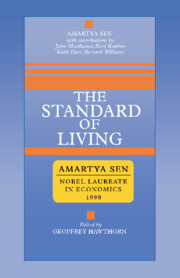Book contents
- Frontmatter
- Contents
- List of contributors
- Introduction
- The Standard of Living: Lecture I, Concepts and Critiques
- The Standard of Living: Lecture II, Lives and Capabilities
- Professor Sen on the Standard of Living
- The Standard of Living: Uncertainty, Inequality and Opportunity
- Commoditisation and the Standard of Living
- The Standard of Living: Interests and Capabilities
- Reply
- Bibliography
- Index
The Standard of Living: Lecture I, Concepts and Critiques
Published online by Cambridge University Press: 23 December 2009
- Frontmatter
- Contents
- List of contributors
- Introduction
- The Standard of Living: Lecture I, Concepts and Critiques
- The Standard of Living: Lecture II, Lives and Capabilities
- Professor Sen on the Standard of Living
- The Standard of Living: Uncertainty, Inequality and Opportunity
- Commoditisation and the Standard of Living
- The Standard of Living: Interests and Capabilities
- Reply
- Bibliography
- Index
Summary
It is hard to think of an idea more immediate than that of the living standard. It figures a good deal in everyday thought. It is, in fact, one of the few economic concepts that is not commonly greeted with the uncommon scepticism reserved for the other concepts of economics, such as ‘perfect competition’, or ‘general equilibrium’, or ‘consumers’ surplus', or ‘social cost’, or the almost supernatural ‘M3’. While people are not prone to ask each other, ‘How is your standard of living these days?’ (at least, not yet), we do not believe we are indulging in technicalities when we talk about the living standard of the pensioners, or of the nurses, or of the miners, or — for that matter — of the chairman of the Coal Board. The standard of living communicates, and does so with apparent ease.
And yet the idea is full of contrasts, conflicts and even contradictions. Within the general notion of the living standard, divergent and rival views of the goodness of life co-exist in an unsorted bundle. There are many fundamentally different ways of seeing the quality of living, and quite a few of them have some immediate plausibility. You could be well off, without being well. You could be well, without being able to lead the life you wanted. You could have got the life you wanted, without being happy. You could be happy, without having much freedom. You could have a good deal of freedom, without achieving much. We can go on.
Information
- Type
- Chapter
- Information
- Tanner Lectures in Human ValuesThe Standard of Living, pp. 1 - 19Publisher: Cambridge University PressPrint publication year: 1987
Accessibility standard: Unknown
Why this information is here
This section outlines the accessibility features of this content - including support for screen readers, full keyboard navigation and high-contrast display options. This may not be relevant for you.Accessibility Information
- 55
- Cited by
